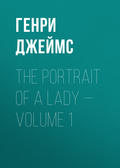
Генри Джеймс
Pandora
Mrs. Dangerfield made it known to Count Otto that every morning after breakfast, the hour at which he wrote his journal in his cabin, the old couple were guided upstairs and installed in their customary corner by Pandora. This she had learned to be the name of their elder daughter, and she was immensely amused by her discovery. “Pandora”—that was in the highest degree typical; it placed them in the social scale if other evidence had been wanting; you could tell that a girl was from the interior, the mysterious interior about which Vogelstein’s imagination was now quite excited, when she had such a name as that. This young lady managed the whole family, even a little the small beflounced sister, who, with bold pretty innocent eyes, a torrent of fair silky hair, a crimson fez, such as is worn by male Turks, very much askew on top of it, and a way of galloping and straddling about the ship in any company she could pick up—she had long thin legs, very short skirts and stockings of every tint—was going home, in elegant French clothes, to resume an interrupted education. Pandora overlooked and directed her relatives; Vogelstein could see this for himself, could see she was very active and decided, that she had in a high degree the sentiment of responsibility, settling on the spot most of the questions that could come up for a family from the interior.
The voyage was remarkably fine, and day after day it was possible to sit there under the salt sky and feel one’s self rounding the great curves of the globe. The long deck made a white spot in the sharp black circle of the ocean and in the intense sea-light, while the shadow of the smoke-streamers trembled on the familiar floor, the shoes of fellow-passengers, distinctive now, and in some cases irritating, passed and repassed, accompanied, in the air so tremendously “open,” that rendered all voices weak and most remarks rather flat, by fragments of opinion on the run of the ship. Vogelstein by this time had finished his little American story and now definitely judged that Pandora Day was not at all like the heroine. She was of quite another type; much more serious and strenuous, and not at all keen, as he had supposed, about making the acquaintance of gentlemen. Her speaking to him that first afternoon had been, he was bound to believe, an incident without importance for herself; in spite of her having followed it up the next day by the remark, thrown at him as she passed, with a smile that was almost fraternal: “It’s all right, sir! I’ve found that old chair.” After this she hadn’t spoken to him again and had scarcely looked at him. She read a great deal, and almost always French books, in fresh yellow paper; not the lighter forms of that literature, but a volume of Sainte-Beuve, of Renan or at the most, in the way of dissipation, of Alfred de Musset. She took frequent exercise and almost always walked alone, apparently not having made many friends on the ship and being without the resource of her parents, who, as has been related, never budged out of the cosy corner in which she planted them for the day.
Her brother was always in the smoking-room, where Vogelstein observed him, in very tight clothes, his neck encircled with a collar like a palisade. He had a sharp little face, which was not disagreeable; he smoked enormous cigars and began his drinking early in the day: but his appearance gave no sign of these excesses. As regards euchre and poker and the other distractions of the place he was guilty of none. He evidently understood such games in perfection, for he used to watch the players, and even at moments impartially advise them; but Vogelstein never saw the cards in his hand. He was referred to as regards disputed points, and his opinion carried the day. He took little part in the conversation, usually much relaxed, that prevailed in the smoking-room, but from time to time he made, in his soft flat youthful voice, a remark which every one paused to listen to and which was greeted with roars of laughter. Vogelstein, well as he knew English, could rarely catch the joke; but he could see at least that these must be choice specimens of that American humour admired and practised by a whole continent and yet to be rendered accessible to a trained diplomatist, clearly, but by some special and incalculable revelation. The young man, in his way, was very remarkable, for, as Vogelstein heard some one say once after the laughter had subsided, he was only nineteen. If his sister didn’t resemble the dreadful little girl in the tale already mentioned, there was for Vogelstein at least an analogy between young Mr. Day and a certain small brother—a candy-loving Madison, Hamilton or Jefferson—who was, in the Tauchnitz volume, attributed to that unfortunate maid. This was what the little Madison would have grown up to at nineteen, and the improvement was greater than might have been expected.
The days were long, but the voyage was short, and it had almost come to an end before Count Otto yielded to an attraction peculiar in its nature and finally irresistible, and, in spite of Mrs. Dangerfield’s emphatic warning, sought occasion for a little continuous talk with Miss Pandora. To mention that this impulse took effect without mentioning sundry other of his current impressions with which it had nothing to do is perhaps to violate proportion and give a false idea; but to pass it by would be still more unjust. The Germans, as we know, are a transcendental people, and there was at last an irresistible appeal for Vogelstein in this quick bright silent girl who could smile and turn vocal in an instant, who imparted a rare originality to the filial character, and whose profile was delicate as she bent it over a volume which she cut as she read, or presented it in musing attitudes, at the side of the ship, to the horizon they had left behind. But he felt it to be a pity, as regards a possible acquaintance with her, that her parents should be heavy little burghers, that her brother should not correspond to his conception of a young man of the upper class, and that her sister should be a Daisy Miller en herbe. Repeatedly admonished by Mrs. Dangerfield, the young diplomatist was doubly careful as to the relations he might form at the beginning of his sojourn in the United States. That lady reminded him, and he had himself made the observation in other capitals, that the first year, and even the second, is the time for prudence. One was ignorant of proportions and values; one was exposed to mistakes and thankful for attention, and one might give one’s self away to people who would afterwards be as a millstone round one’s neck: Mrs. Dangerfield struck and sustained that note, which resounded in the young man’s imagination. She assured him that if he didn’t “look out” he would be committing himself to some American girl with an impossible family. In America, when one committed one’s self, there was nothing to do but march to the altar, and what should he say for instance to finding himself a near relation of Mr. and Mrs. P. W. Day?—since such were the initials inscribed on the back of the two chairs of that couple. Count Otto felt the peril, for he could immediately think of a dozen men he knew who had married American girls. There appeared now to be a constant danger of marrying the American girl; it was something one had to reckon with, like the railway, the telegraph, the discovery of dynamite, the Chassepôt rifle, the Socialistic spirit: it was one of the complications of modern life.
It would doubtless be too much to say that he feared being carried away by a passion for a young woman who was not strikingly beautiful and with whom he had talked, in all, but ten minutes. But, as we recognise, he went so far as to wish that the human belongings of a person whose high spirit appeared to have no taint either of fastness, as they said in England, or of subversive opinion, and whose mouth had charming lines, should not be a little more distinguished. There was an effect of drollery in her behaviour to these subjects of her zeal, whom she seemed to regard as a care, but not as an interest; it was as if they had been entrusted to her honour and she had engaged to convey them safe to a certain point; she was detached and inadvertent, and then suddenly remembered, repented and came back to tuck them into their blankets, to alter the position of her mother’s umbrella, to tell them something about the run of the ship. These little offices were usually performed deftly, rapidly, with the minimum of words, and when their daughter drew near them Mr. and Mrs. Day closed their eyes after the fashion of a pair of household dogs who expect to be scratched.
One morning she brought up the Captain of the ship to present to them; she appeared to have a private and independent acquaintance with this officer, and the introduction to her parents had the air of a sudden happy thought. It wasn’t so much an introduction as an exhibition, as if she were saying to him: “This is what they look like; see how comfortable I make them. Aren’t they rather queer and rather dear little people? But they leave me perfectly free. Oh I can assure you of that. Besides, you must see it for yourself.” Mr. and Mrs. Day looked up at the high functionary who thus unbent to them with very little change of countenance; then looked at each other in the same way. He saluted, he inclined himself a moment; but Pandora shook her head, she seemed to be answering for them; she made little gestures as if in explanation to the good Captain of some of their peculiarities, as for instance that he needn’t expect them to speak. They closed their eyes at last; she appeared to have a kind of mesmeric influence on them, and Miss Day walked away with the important friend, who treated her with evident consideration, bowing very low, for all his importance, when the two presently after separated. Vogelstein could see she was capable of making an impression; and the moral of our little matter is that in spite of Mrs. Dangerfield, in spite of the resolutions of his prudence, in spite of the limits of such acquaintance as he had momentarily made with her, in spite of Mr. and Mrs. Day and the young man in the smoking-room, she had fixed his attention.
It was in the course of the evening after the scene with the Captain that he joined her, awkwardly, abruptly, irresistibly, on the deck, where she was pacing to and fro alone, the hour being auspiciously mild and the stars remarkably fine. There were scattered talkers and smokers and couples, unrecognisable, that moved quickly through the gloom. The vessel dipped with long regular pulsations; vague and spectral under the low stars, its swaying pinnacles spotted here and there with lights, it seemed to rush through the darkness faster than by day. Count Otto had come up to walk, and as the girl brushed past him he distinguished Pandora’s face—with Mrs. Dangerfield he always spoke of her as Pandora—under the veil worn to protect it from the sea-damp. He stopped, turned, hurried after her, threw away his cigar—then asked her if she would do him the honour to accept his arm. She declined his arm but accepted his company, and he allowed her to enjoy it for an hour. They had a great deal of talk, and he was to remember afterwards some of the things she had said. There was now a certainty of the ship’s getting into dock the next morning but one, and this prospect afforded an obvious topic. Some of Miss Day’s expressions struck him as singular, but of course, as he was aware, his knowledge of English was not nice enough to give him a perfect measure.
“I’m not in a hurry to arrive; I’m very happy here,” she said. “I’m afraid I shall have such a time putting my people through.”
“Putting them through?”
“Through the Custom-House. We’ve made so many purchases. Well, I’ve written to a friend to come down, and perhaps he can help us. He’s very well acquainted with the head. Once I’m chalked I don’t care. I feel like a kind of blackboard by this time anyway. We found them awful in Germany.”
Count Otto wondered if the friend she had written to were her lover and if they had plighted their troth, especially when she alluded to him again as “that gentleman who’s coming down.” He asked her about her travels, her impressions, whether she had been long in Europe and what she liked best, and she put it to him that they had gone abroad, she and her family, for a little fresh experience. Though he found her very intelligent he suspected she gave this as a reason because he was a German and she had heard the Germans were rich in culture. He wondered what form of culture Mr. and Mrs. Day had brought back from Italy, Greece and Palestine—they had travelled for two years and been everywhere—especially when their daughter said: “I wanted father and mother to see the best things. I kept them three hours on the Acropolis. I guess they won’t forget that!” Perhaps it was of Phidias and Pericles they were thinking, Vogelstein reflected, as they sat ruminating in their rugs. Pandora remarked also that she wanted to show her little sister everything while she was comparatively unformed (“comparatively!” he mutely gasped); remarkable sights made so much more impression when the mind was fresh: she had read something of that sort somewhere in Goethe. She had wanted to come herself when she was her sister’s age; but her father was in business then and they couldn’t leave Utica. The young man thought of the little sister frisking over the Parthenon and the Mount of Olives and sharing for two years, the years of the school-room, this extraordinary pilgrimage of her parents; he wondered whether Goethe’s dictum had been justified in this case. He asked Pandora if Utica were the seat of her family, if it were an important or typical place, if it would be an interesting city for him, as a stranger, to see. His companion replied frankly that this was a big question, but added that all the same she would ask him to “come and visit us at our home” if it weren’t that they should probably soon leave it.
“Ah, you’re going to live elsewhere?” Vogelstein asked, as if that fact too would be typical.
“Well, I’m working for New York. I flatter myself I’ve loosened them while we’ve been away,” the girl went on. “They won’t find in Utica the same charm; that was my idea. I want a big place, and of course Utica—!” She broke off as before a complex statement.
“I suppose Utica is inferior—?” Vogelstein seemed to see his way to suggest.
“Well no, I guess I can’t have you call Utica inferior. It isn’t supreme—that’s what’s the matter with it, and I hate anything middling,” said Pandora Day. She gave a light dry laugh, tossing back her head a little as she made this declaration. And looking at her askance in the dusk, as she trod the deck that vaguely swayed, he recognised something in her air and port that matched such a pronouncement.
“What’s her social position?” he inquired of Mrs. Dangerfield the next day. “I can’t make it out at all—it’s so contradictory. She strikes me as having much cultivation and much spirit. Her appearance, too, is very neat. Yet her parents are complete little burghers. That’s easily seen.”
“Oh, social position,” and Mrs. Dangerfield nodded two or three times portentously. “What big expressions you use! Do you think everybody in the world has a social position? That’s reserved for an infinitely small majority of mankind. You can’t have a social position at Utica any more than you can have an opera-box. Pandora hasn’t got one; where, if you please, should she have got it? Poor girl, it isn’t fair of you to make her the subject of such questions as that.”
“Well,” said Vogelstein, “if she’s of the lower class it seems to me very—very—” And he paused a moment, as he often paused in speaking English, looking for his word.
“Very what, dear Count?”
“Very significant, very representative.”
“Oh dear, she isn’t of the lower class,” Mrs. Dangerfield returned with an irritated sense of wasted wisdom. She liked to explain her country, but that somehow always required two persons.
“What is she then?”
“Well, I’m bound to admit that since I was at home last she’s a novelty. A girl like that with such people—it is a new type.”
“I like novelties”—and Count Otto smiled with an air of considerable resolution. He couldn’t however be satisfied with a demonstration that only begged the question; and when they disembarked in New York he felt, even amid the confusion of the wharf and the heaps of disembowelled baggage, a certain acuteness of regret at the idea that Pandora and her family were about to vanish into the unknown. He had a consolation however: it was apparent that for some reason or other—illness or absence from town—the gentleman to whom she had written had not, as she said, come down. Vogelstein was glad—he couldn’t have told you why—that this sympathetic person had failed her; even though without him Pandora had to engage single-handed with the United States Custom-House. Our young man’s first impression of the Western world was received on the landing-place of the German steamers at Jersey City—a huge wooden shed covering a wooden wharf which resounded under the feet, an expanse palisaded with rough-hewn piles that leaned this way and that, and bestrewn with masses of heterogeneous luggage. At one end; toward the town, was a row of tall painted palings, behind which he could distinguish a press of hackney-coachmen, who brandished their whips and awaited their victims, while their voices rose, incessant, with a sharp strange sound, a challenge at once fierce and familiar. The whole place, behind the fence, appeared to bristle and resound. Out there was America, Count Otto said to himself, and he looked toward it with a sense that he should have to muster resolution. On the wharf people were rushing about amid their trunks, pulling their things together, trying to unite their scattered parcels. They were heated and angry, or else quite bewildered and discouraged. The few that had succeeded in collecting their battered boxes had an air of flushed indifference to the efforts of their neighbours, not even looking at people with whom they had been fondly intimate on the steamer. A detachment of the officers of the Customs was in attendance, and energetic passengers were engaged in attempts to drag them toward their luggage or to drag heavy pieces toward them. These functionaries were good-natured and taciturn, except when occasionally they remarked to a passenger whose open trunk stared up at them, eloquent, imploring, that they were afraid the voyage had been “rather glassy.” They had a friendly leisurely speculative way of discharging their duty, and if they perceived a victim’s name written on the portmanteau they addressed him by it in a tone of old acquaintance. Vogelstein found however that if they were familiar they weren’t indiscreet. He had heard that in America all public functionaries were the same, that there wasn’t a different tenue, as they said in France, for different positions, and he wondered whether at Washington the President and ministers, whom he expected to see—to have to see—a good deal of, would be like that.
He was diverted from these speculations by the sight of Mr. and Mrs. Day seated side by side upon a trunk and encompassed apparently by the accumulations of their tour. Their faces expressed more consciousness of surrounding objects than he had hitherto recognised, and there was an air of placid expansion in the mysterious couple which suggested that this consciousness was agreeable. Mr. and Mrs. Day were, as they would have said, real glad to get back. At a little distance, on the edge of the dock, our observer remarked their son, who had found a place where, between the sides of two big ships, he could see the ferry-boats pass; the large pyramidal low-laden ferry-boats of American waters. He stood there, patient and considering, with his small neat foot on a coil of rope, his back to everything that had been disembarked, his neck elongated in its polished cylinder, while the fragrance of his big cigar mingled with the odour of the rotting piles, and his little sister, beside him, hugged a huge post and tried to see how far she could crane over the water without falling in. Vogelstein’s servant was off in search of an examiner; Count Otto himself had got his things together and was waiting to be released, fully expecting that for a person of his importance the ceremony would be brief.







